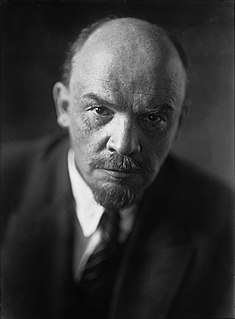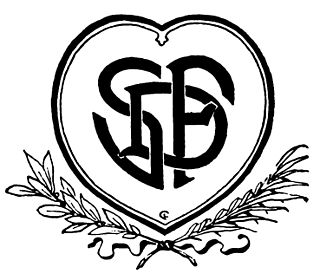Related Research Articles

Leninism is a political ideology developed by Russian Marxist revolutionary Vladimir Lenin that proposes the establishment of the dictatorship of the proletariat led by a revolutionary vanguard party, as the political prelude to the establishment of communism. The function of the Leninist vanguard party is to provide the working classes with the political consciousness and revolutionary leadership necessary to depose capitalism in the Russian Empire (1721–1917). Leninist revolutionary leadership is based upon The Communist Manifesto (1848) identifying the communist party as "the most advanced and resolute section of the working class parties of every country; that section which pushes forward all others." As the vanguard party, the Bolsheviks viewed history through the theoretical framework of dialectical materialism, which sanctioned political commitment to the successful overthrow of capitalism, and then to instituting socialism; and, as the revolutionary national government, to realize the socio-economic transition by all means.

The Independent Labour Party (ILP) was a British political party of the left, established in 1893, when the Liberals appeared reluctant to endorse working-class candidates, representing the interests of the majority. A sitting independent MP and prominent union organiser, Keir Hardie, became its first chairman.

Socialism in New Zealand had little traction in early colonial New Zealand but developed as a political movement around the beginning of the 20th century. Much of socialism's early growth was found in the labour movement.

The Young Fabians is the under age 31 section of the Fabian Society, a socialist society in the United Kingdom that is affiliated to the Labour Party. The Young Fabians operate as a membership-driven think tank that organises policy debates, research projects, publications, conferences, and international delegations. The organisation holds no collective position on policy.

The Cambridge University Labour Club (CULC), formerly known as Cambridge Universities Labour Club, is a student political society, first founded as the Cambridge University Fabian Society in 1905, to provide a voice for British Labour Party values of socialism and social democracy at the University of Cambridge. Although the society served only University of Cambridge students for most of its history, in 2007, membership was also opened up to students of Anglia Ruskin. In 2018, with the setting up of a student society for Labour members at Anglia Ruskin, the society reverted to existing for Cambridge University students only. CULC's varied past has seen it go through several disaffiliations with the national Labour Party, including periods in the 1960s and 1970s when it was under the influence of the entryist Militant tendency. It is currently affiliated to the Labour Party and the Cambridge Constituency Labour Party.

Socialism in Canada has a long history and along with conservatism and liberalism is a political force in Canada.

The British Left is a range of political parties and movements in the United Kingdom. These can take the position of either centre-left, left-wing or far-left.
Social democracy is a political, social and economic philosophy within socialism. As a policy regime, it is described by academics as advocating economic and social interventions to promote social justice within the framework of a liberal-democratic polity and a capitalist-oriented mixed economy. The protocols and norms used to accomplish this involve a commitment to representative and participatory democracy, measures for income redistribution, regulation of the economy in the general interest and social-welfare provisions. Due to longstanding governance by social democratic parties during the post-war consensus and their influence on socioeconomic policy in Northern and Western Europe, social democracy became associated with Keynesianism, the Nordic model, the social liberal paradigm and welfare states within political circles in the late 20th century. It has been described as the most common form of Western or modern socialism as well as the reformist wing of democratic socialism.

The Fabian Society is a British socialist organisation whose purpose is to advance the principles of democratic socialism via gradualist and reformist effort in democracies, rather than by revolutionary overthrow.
Socialism in the United Kingdom is thought to stretch back to the 19th century from roots arising in the aftermath of the English Civil War. Notions of socialism in Great Britain have taken many different forms from the utopian philanthropism of Robert Owen through to the reformist electoral project enshrined in the birth of the Labour Party.
The Socialist Alliance was a left-wing electoral alliance in England between 1992 and 2005.

The Social Democratic Federation (SDF) was established as Britain's first organised socialist political party by H. M. Hyndman, and had its first meeting on 7 June 1881. Those joining the SDF included William Morris, George Lansbury, James Connolly and Eleanor Marx. However, Friedrich Engels, Karl Marx's long-term collaborator, refused to support Hyndman's venture. Many of its early leading members had previously been active in the Manhood Suffrage League.

The Socialist Party of Great Britain (SPGB) is a socialist political party in the United Kingdom. Founded in 1904 as a split from the Social Democratic Federation (SDF), it advocates using the ballot box for revolutionary purposes and opposes both Leninism and reformism. It holds that countries which claimed to have established socialism had only established "state capitalism" and was one of the first to describe the Soviet Union as state capitalist. The party's political position has been described as a form of impossibilism.
The World Socialist Movement (WSM) is an international organisation of socialist parties created in 1904 with the founding of the Socialist Party of Great Britain (SPGB).
Ethical socialism is a political philosophy that appeals to socialism on ethical and moral grounds as opposed to consumeristic, economic, and egoistic grounds. It emphasizes the need for a morally conscious economy based upon the principles of altruism, cooperation, and social justice while opposing possessive individualism.
Reformism is a political doctrine advocating the reform of an existing system or institution instead of its abolition and replacement.
The history of socialism has its origins in the 1789 French Revolution and the changes which it brought, although it has precedents in earlier movements and ideas. The Communist Manifesto was written by Karl Marx and Friedrich Engels in 1848 just before the Revolutions of 1848 swept Europe, expressing what they termed scientific socialism. In the last third of the 19th century, social democratic parties arose in Europe, drawing mainly from Marxism. The Australian Labor Party was the world's first elected socialist party when it formed government in the Colony of Queensland for a week in 1899.
Maria Martha Saran, known as Mary Saran, was a journalist and author. In 1933 she emigrated from her native Germany to England, where she took British nationality and where she lived for the rest of her life.
Allan Flanders was a British, academic, author, and founding member of the Oxford School of Industrial Relations, along with Hugh Clegg, Alan Fox, Lord William McCarthy, Sir George Bain and Otto Kahn-Freund. The school was a developer of the idea of collective bargaining and overall proponents of bargaining power, legal contracts, normative regulation and institutionalized conflict resolutions as issues of significance and focus in the field of industrial relations.